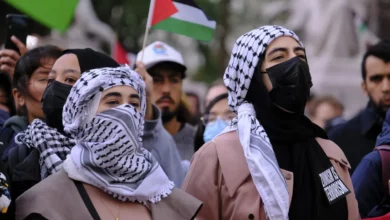Thousands of Egyptians were politically active during the 25 January revolution that toppled President Hosni Mubarak after 30 years of dictatorial rule.
The revolution–notably embodied by the occupation of Tahrir Square for 18 days by protesters from across the nation–has nurtured an interest in activism that has survived the square's evacuation.
Having discovered their capacity to induce political change, Egyptians are not ready to give up their new roles. These roles are evolving from the Tahrir protests to take on various new forms, not all of them street-based.
Many have taken their activism from the square to their workplaces. Those participating in the labor protests that have swept the country in the past week believe their strikes are an extension of the political roles they first assumed in Tahrir.
Hossam al-Badry, a manager in the Bank for Development and Agricultural Credit, said during a protest organized by the bank’s employees that getting rid of corrupt heads of public organizations is the next step after getting rid of the government.
“We cleaned the regime, now it’s time to clean all the sectors,” he said.
Workers and employees at the bank say that the success of the revolution gave them the courage to move from demanding their political rights to demanding their financial rights at work. They were even shouting the same slogans that reverberated in Tahrir for three weeks.
“Whoever talked before had his head cut off, but now there is freedom,” said Sabry Ragab, another bank employee. His colleague al-Badry said that before now, people who complained were punished by demotion or legal action.
“This is an opportunity–we have to take advantage of it to demand our rights and bring down all the figures of corruption, not only in the government but also in all the sectors,” said an employee at the bank's Alexandria branch, Khalil Abdel Aziz. He added that complaints had always fallen on deaf ears, but now there is a new confidence that pleas will be heard and taken care of.
Samer Soliman, a political science professor at the American University in Cairo, explained people’s eagerness to stay involved by the fact that the large dose of political participation in the last three weeks came after being completely deprived of it for 30 years. “It’s like they were fasting for a long time and broke their fast with a big meal.”
Soliman said that while protest was the most important form of political participation in the past weeks, it now must take a secondary role to other forms.
He said the most productive way to channel the people’s political energies in this phase is by creating new political institutions, most importantly parties and labor syndicates, to contain the people who have become involved since 25 January.
“There are more than one million people who became politically involved recently. If they became members in parties, they will keep being politically active.”
Existing parties and labor syndicates are charged with being either inactive or not representative of the people. Some, indeed, are guilty of these charges.
A group of young activists are already in the process of creating a party called the 25 January Party for Development and Renaissance, which they consider “the first practical and democratic party in Egypt’s modern history.” They describe themselves as young people with no previous political affiliations who took part in the protests.
Adham Hassan, one of the party’s founders, says it has already received 50,000 applications and is now choosing its 50 founding members.
During Mubarak’s rule, the law organizing the foundation of political parties and the committee approving new parties reportedly placed many restrictions on political liberties.
For other protesters of the 25 January revolution, politics will extend to their everyday practice, beyond strikes, demonstrations and political parties.
After having functioned as pressure tools for the past weeks, activists who were not politically active before told Al-Masry Al-Youm that they identified their roles in the next phase as watchdogs.
They plan to make sure that the new government will keep its promises.
“Personally I will start to spread political awareness and make sure that I galvanize more people. And if we get crushed or hindered, I will put everybody I know on guard and we will be back to the streets again,” says Ahmed Abou Hussein, who was heavily involved in the Tahrir protests.
Other activists look to proposing institutional changes that will pave the way to democracy.
Emboldened by the success of the revolution, Amr al-Geddawy, another protester, suggests that police officers wear nametags so that the public can report violations. “Officers should know that we have power over them, just as they have power over us,” says al-Geddawy.
Also inspired by the wave of popular participation, Ahmed Farag, a lawyer, suggests the formation of a civil association in every street, to be responsible for its maintenance.
Soliman says that the various logistical committees who successfully managed traffic, security and cleanliness in Tahrir Square throughout the last month revealed Egyptians’ willingness to participate in community work, which he says must be further utilized.
For most of those who left the square after 11 February, the moment is ripe with opportunities to articulate their politicization through a myriad of acts.




